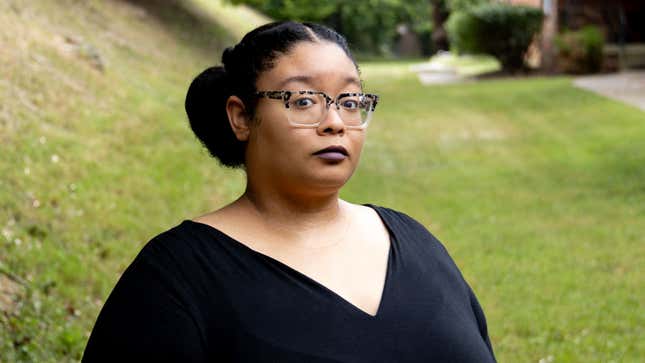Woman in Tennessee Was Denied Abortion Despite Fetus Growing Organs Outside Itself
Nicole Blackmon's horrific story is detailed as part of a new set of lawsuits filed on behalf of 8 women in 3 states who were denied emergency abortion care.
AbortionPolitics

Nicole Blackmon learned she was pregnant about a month before Tennessee’s near-total abortion ban went into effect in July 2022. She’d previously been told conceiving a pregnancy would be difficult because of multiple health diagnoses, including a pseudotumor. Still, the pregnancy was a “blessing,” as her only child had been killed in a drive-by shooting months earlier.
At about 15 weeks, Blackmon learned her fetus likely had omphalocele (a condition that affects the development of the abdominal wall, leading to organs growing outside the body) and “atypically” positioned feet. She was told this was a “lethal anomaly.”
Blackmon’s now the lead plaintiff in a lawsuit filed Tuesday on behalf of three women and two doctors in Tennessee by pro-abortion advocacy groups. The suit is joined by a similar lawsuit in Idaho and an administrative complaint in Oklahoma. All three were filed by the Center for Reproductive Rights on behalf of eight women, in total, who were denied abortion care, despite suffering horrific health complications in states that purport to have medical exceptions to their near-total abortion bans. But each state’s ban includes confusing language and possible criminal penalties, which is scaring providers away from helping patients whose medical conditions warrant emergency abortion care.
“With today’s filings, we are seeking to put an end to this chaos and give doctors clarity on when they can provide abortion care,” Marc Hearron, an attorney for the Center, said during a press call.
Tuesday’s lawsuits (and the administrative complaint) are a part of the Center’s latest legal strategy more than a year after the fall of Roe v. Wade. These legal actions—instead of challenging the various abortion bans themselves—contend that while the laws attempted “to promote healthy babies and families, it has done just the opposite.” Instead, lawmakers’ zeal to block abortion and bodily autonomy has left citizens unable to receive adequate care even, as in the case of Blackmon and other people, the patients stare death in the face due to life-threatening pregnancy complications.
Blackmon is joined by two doctors and two more plaintiffs: Allyson Phillips, who found out her daughter was incompatible with life at 18 weeks, and Kaitlyn Dulong, whose abortion care for cervical insufficiency was delayed more than a week because of Tennessee’s ban.
-

-

-

-

-

-

-

-

-

-

-

-

-

-

-

-

-

-

-

-

-

-

-

-

-

-

-

-

-

-

-

-

-

-

-

-

-

-

-

-









































